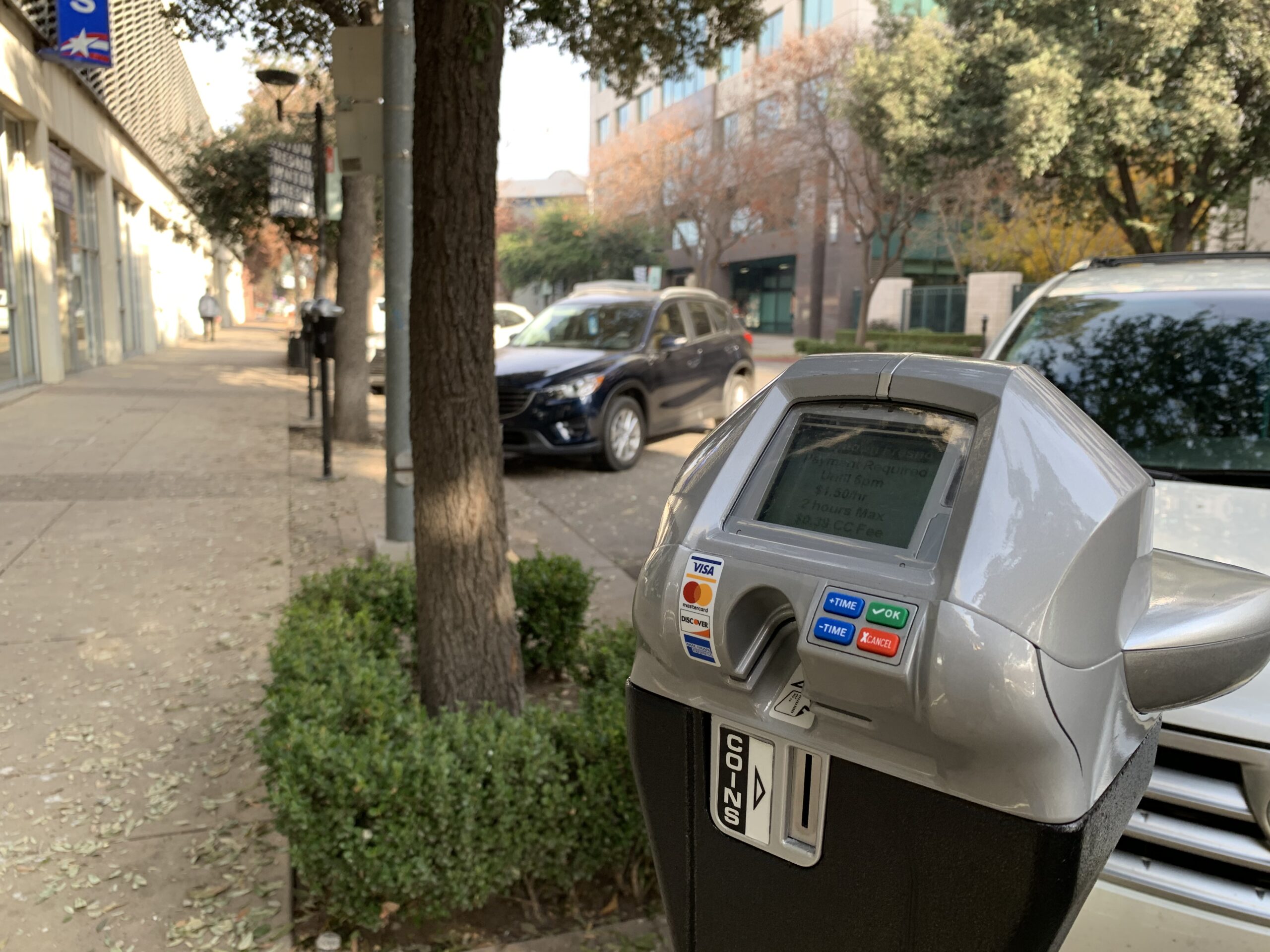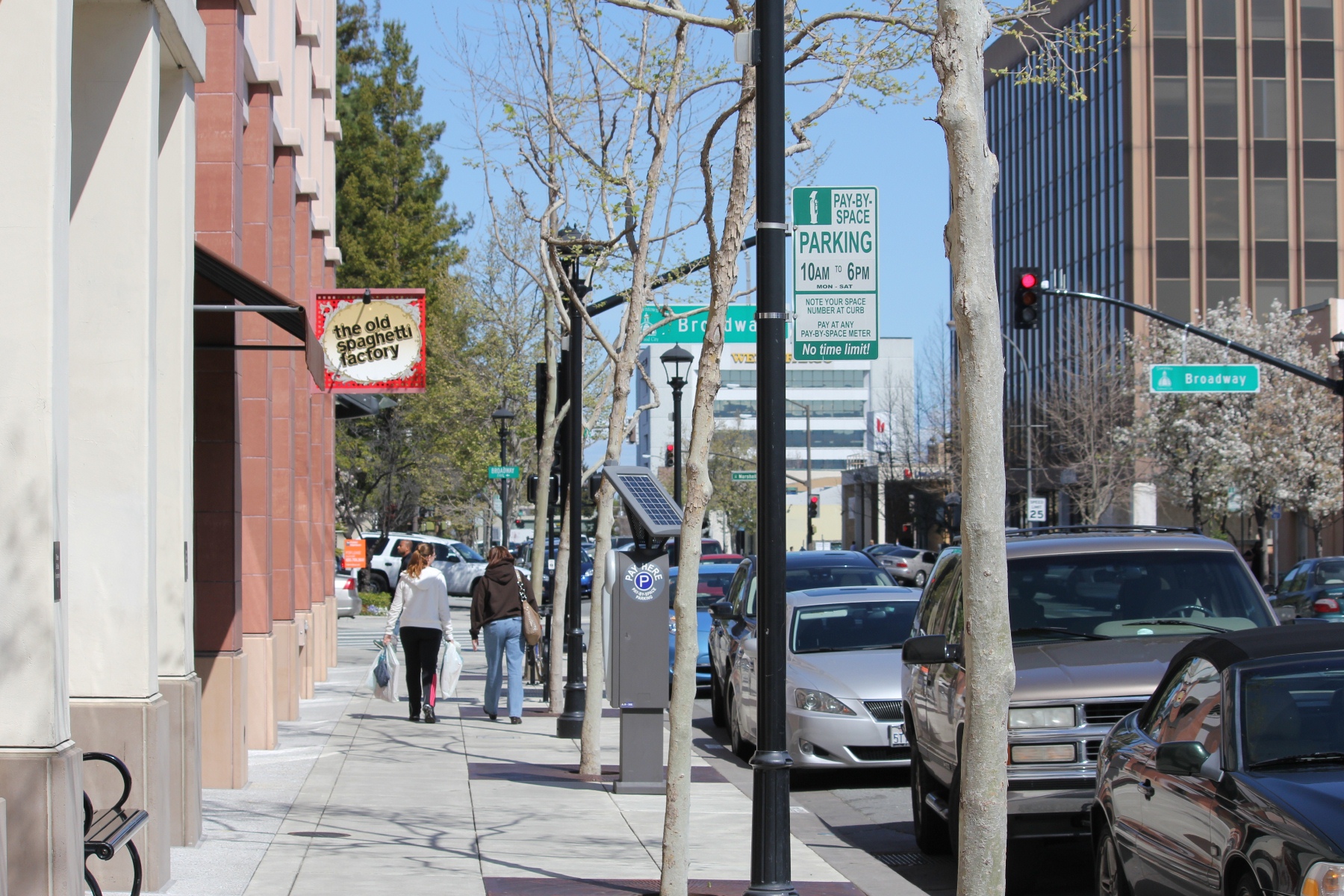Form follows parking. When cities don’t manage their parking supply effectively, inordinate amounts of valuable land are occupied by asphalt wastelands that are unused much of the time. Parking must be addressed in a very strategic manner in order to create successful 21st century communities. Parking must not crowd out other important activities such as housing, commerce, bike lanes, transit, and public spaces. As proposed by professor Donald Shoup in The High Cost of Free Parking, on-street parking in busy areas should be priced in a way that is proportional to the demand so that occupancy is usually about 85%, meaning there are always a few empty spots on every block. This lowers traffic, noise, and pollution by reducing the need to cruise around the block over and over to find a space. Likewise, off-street parking should be priced and managed to attract workers and other long-term parkers so that curbside spaces are available for the customers of ground-floor businesses. Finally, the number of needed spaces should be reduced by reducing or eliminating minimum parking requirements and encouraging parking to be shared between land uses with complimentary peak activity periods. ZUS founder Dan Zack has experience in creating and implementing programs that address all of these important issues.
Examples of Zack’s parking management work include:
Parking Division Leadership
Year(s): 2018 to 2020
Role: City Staff
Jurisdiction: City of Fresno

For 2 ½ years Mr. Zack oversaw the Current Parking Division of the Planning and Development Department. In this capacity Mr. Zack oversaw a staff of 30 parking enforcement, meter repair, coin collection, and administrative staff and hired and supervised the Parking Manager. During this time, the entire Downtown parking supply was mapped in GIS for the first time, monthly parking pricing and agreements were standardized, the potential benefits of a parking authority were analyzed, meter and garage prices were adjusted in response to average occupancy as a first step toward performance-based pricing, a new parking garage operations vendor was retained, time limits were simplified, a pay-by-phone system was launched, and digital credit card-enabled parking meters were selected and purchased (with the installation happening after Mr. Zack’s involvement).
Additional Information:
Parklet Pilot Program
Year(s): 2018 to 2019
Role: City Staff
Jurisdiction: City of Fresno

Mr. Zack led a staff team from the Planning & Development and Public Works departments to develop a pilot program for outdoor dining parklets which could be installed by business owners in the parking lane adjacent to their establishments. The program received a positive reception and resulted in one initial parklet being installed prior to the Covid -19 crisis. The pilot program was then absorbed into an expanded and expedited program that was designed to serve as a mitigation to the pandemic.
Additional Information:
Downtown Parking Management Plan
Year(s): 2004 to 2007
Jurisdiction: City of Redwood City
Role: City Staff

As Downtown Redwood City began to revitalize, it was clear that its parking system was not prepared to handle an influx of new visitors. At the same time, the simultaneous overcrowding of prime parking spaces and underuse of other parking areas made it clear that this was not a problem that the city could build its way out of. Mr. Zack was asked to develop an innovative plan that would effectively manage the system. As project manager, he created the first performance-based parking system in the nation. Other pioneering aspects of the plan include elimination of time limits and installation of computerized multi-space parking meters. This work was conducted entirely in-house without consultant support. The plan was featured in a story in the Wall Street Journal which explored several innovative new approaches to parking in the US. The plan was named as Parking Program of the Year by the California Public Parking Association in 2008.
Additional Information:
Downtown Parking Requirements Update
Year(s): 2005 to 2006
Role: City Staff
Jurisdiction: City of Redwood City
As it sought to intensify its Downtown as a dense, walkable, mixed-use urban center, Redwood City leadership realized that the conventional suburban parking requirements that governed the area were out of step with this goal. Mr. Zack was asked to develop new parking requirements for Downtown Redwood City and served as the primary author of the implementing ordinance. Key features of this ordinance include reduced parking ratios, a unique blended commercial ratio, parking maximums, shared parking incentives, and an in-lieu fee program. This ordinance was an important factor in the successful launching of several Downtown businesses and development projects which could not have moved forward under the old requirements. All work was conducted in-house without consultant support.
Additional Information:

